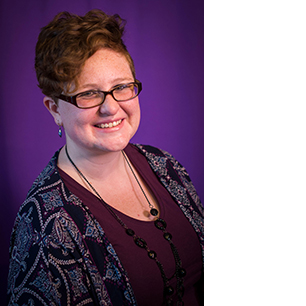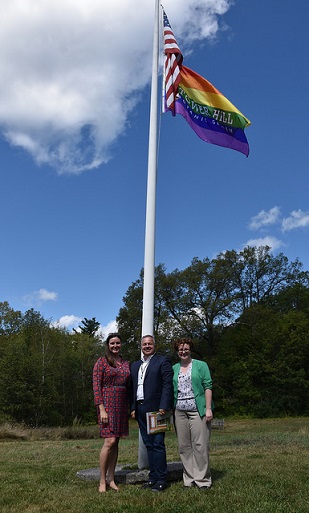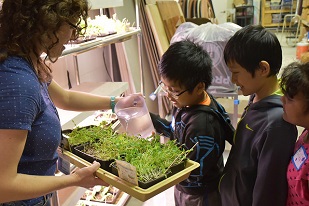From the NEMA Fellow: Garden for All
By Ali Kane (she/her/hers), Executive & Advancement Assistant, Tower Hill Botanic Garden

Ali Kane is the 2017/18 NEMA Fellow. As part of the fellowship Ali is writing a series of articles for the NEMA community.
Garden for All
A Year in the Diversity, Equity, and Inclusion Journey of Tower Hill Botanic Garden
At 2pm on a Tuesday, you don’t expect that an email about proofing marketing copy is going to make you cry. However, it absolutely can.
One day a few weeks ago, I decided to put my preferred gender pronouns in my email signature. I had seen a few representatives from the Massachusetts Cultural Coalition do this, some bloggers and journalists, professors from universities. I had to update my signature anyways so I decided now was as good a time as any. As an ally to the trans* and gender non-conforming communities, it was important that I do this.
The next week, our CFOO noticed that I did this, which sparked a conversation about some LGBTQ+ human resources topics. A few days later, our CEO texted me from a conference session on Diversity & Inclusion, asking for information about how to properly note hers in her email signature. A few days after that I received an email from the Director of Education and noticed her pronouns in her signature, as well. That was when my eyes began to water with joy.
At Tower Hill, our strategic plan boasts “Inclusivity” as one of our five core values. In 2015, we were excited to open our first universally-designed space, The Court: A Garden Within Reach, prominently located at the entrance to the visitors center. Each spring, our grounds fill with laughter as we welcome second graders from Worcester Public Schools. On the surface, you might say that this is a job well done. However, at Tower Hill, we don’t; we see this as just the start.
From my first week as the Executive and Advancement Assistant, I was immediately excited by how the CEO, at that time on the job for only a month, infused every leadership meeting with a commitment to ensuring every person in the community felt welcome and inspired at the Garden. The trustees’ Governance Committee discussed aspirations of diversifying the board, especially to ensure the cultural and racial backgrounds the Worcester area population were represented. The program team was gearing up for Botanic Tattoo Weekend, an event that welcomed new audiences, primarily young professionals, students, and families, which turned out being the most popular non-holiday event weekend of 2017. The staff directors worked to strengthen our connections to the neighboring city of Worcester and our hometown of Boylston through outreach programs. Immediately, I recognized that this was a place focused on more than plants, it was focused on people.
When I brought forward the idea of participating in Worcester Pride, I was nervous. I knew we were trying to be inclusive and increase diversity and I had no issue being the only out person on the full-time staff, however, this seemed like something too bold for me to propose after only a month on the job. But I did. The response from the CFOO: “Can we have a rainbow flag?” I was elated and the directors were thrilled to participate. That September, on the first day of Worcester Pride Week, our board president and CEO spoke about the Tower Hill’s commitment to being a garden for all and we raised a rainbow flag high atop our hill.

L to R: CEO Grace Elton, Board President Jim Karadimos, and Executive & Advancement Assistant Ali Kane at the pride flag raising on September 8, 2017
That weekend, after marching down Main Street handing out colorful leis to passers-by in the Pride Parade, I engaged with new faces, some who had never heard of Tower Hill before, others who had attended a wedding or our holiday lights show, and few who were loyal fans. Following the event, I realized what had been accomplished with just a simple question: Tower Hill proved itself an ally to its LGBTQ+ employees, visitors, and greater Worcester community. An intern later told me that they had been questioning whether or not they would be out at work. When I had announced our participation in these events early in the summer, that was no longer a worry for them.
I wasn’t the only one who was proposing bold ideas. The previous spring, the Special Events & Exhibitions Coordinator, Kirsten Swartz, reached out to the Worcester Refugee Assistance Program (WRAP) about how Tower Hill could support the participants in their program. At other institutions, she had collaborated with organizations that support refugees, understanding that museums are social and educational spaces, where children can learn in a low-pressure environment. The children in the WRAP youth group ranged in age from 5 to 19, all sharing a common experience of being relocated from Burma to Worcester with their families.
Rather than impose curriculum on the group, Kirsten worked with the WRAP facilitators to create a program based on the interests and needs of the kids. As a result, Tower Hill education staff and volunteers hosted a series of visits for the youth, exploring the world of horticulture through gardening, art, and cooking. At a time when the kids may have felt out of control or disconnected after their move, the activities at Tower Hill allowed them to learn new skills, take ownership over a garden space, and begin to feel at home in a new city.

Youth from the Worcester Refugee Assistance Program take care of seedlings, Spring 2017
The partnership with WRAP proved how the garden setting can be welcoming for people with drastically different experiences than others in our community and staff. Unfortunately, not every visitor has the opportunity to participate in such a thoughtful program. Because of that, it is important that our daily operations and staff are just as inviting to each person who comes through our gates.
The staff leadership continues to grapple with how to break down barriers to connecting with horticulture at Tower Hill. This summer, we launched Free After Three Thursdays as an opportunity to open the Garden to visitors who may not typically be able to visit. The extended hours allow people to visit after working a long day; eliminating the admission fee eliminates cost barriers; the lawn games and beer garden serve as a friendly introduction to the Garden for those who have never visited before. In the first five weeks of the summer program, we have witnessed many people visiting for the first time or returning after attending a wedding or lapsed membership many years ago. Free After Three is a way of welcoming new audiences, exposing them to the natural world, and giving them a taste of what Tower Hill has to offer in hopes they will visit again without the financial burden.
While this program is a success in regards to mission and inclusivity, we understand that there are still obstacles that exist. There is no public transportation to the Garden; all of our collateral is in English; many of our paths are difficult to travel by wheelchair, walker, or stroller. However, with every new event that is launched or capital project that is undertaken, staff at all levels are looking for ways that we can make small adjustments or large overhauls to ensure more visitors can be exposed to horticulture through our programs and grounds. These efforts have proven to have positive business impact as well, as we continue to break our own attendance records each year. We understand that not all of our supporters may understand the initiatives we take on or to whom we are opening our doors, but it remains important that the Garden be truly committed to our value of inclusivity without exception.
“For me, Tower Hill is a very pretty place. It is a place that I always imagine as a fairy tale land,” one WRAP participant explained. “Tower Hill is important for me and my community because it [reminds us of] our country. It also helps the community to never forget about the flowers and the plants. In this modern world, which causes a lot of pollution, it is nice to have a place that protects the plants and flowers.”
The WRAP partnership and the impact it had on the youth demonstrate how important nature can be in our lives because it is all around us everywhere that we go. Every day, visitors engage with Tower Hill in a multitude of ways. They may take art classes or exercise classes; they come to meditate or read; they go for a hike in the woodlands; they propose to loved ones and exchange vows; they honor those that have passed at memorials; they laugh and catch up with friends over wine. What I have grown to appreciate about botanic gardens is the endless ways people can engage with our collections, grounds, and programs and how any one can find something that inspires them.
My colleagues embrace this mindset. Working as a team, we are bringing the Garden to new heights, welcoming more people to our events, and engaging visitors with the natural world in new and exciting ways. Every day is an opportunity to improve how we do what we do so someone else feels welcome at the Garden. Over the past year, as I’ve observed diversity, equity, and inclusion at Tower Hill, I’ve recognized that there are always opportunities to take small steps or bold changes to make meaningful change at the Garden and, maybe, just maybe, the world.
